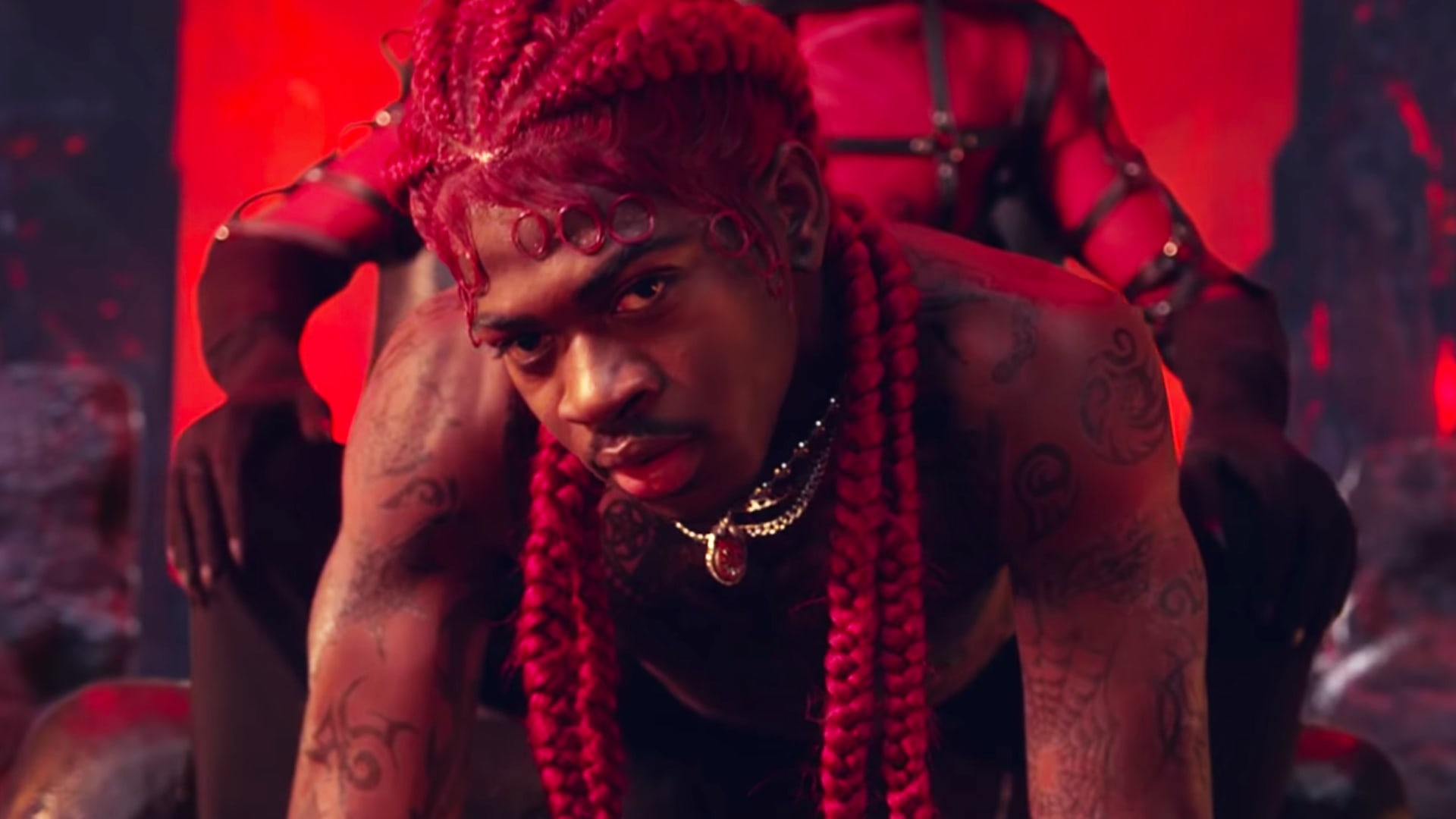
Lil Nas X has cultivated a reputation as one of pop culture’s biggest trolls, and he’s embarked on his most ambitious (and important) campaign yet. He debuted his “Montero (Call Me By Your Name)” video on March 26, a satirical “gotcha” to homophobic listeners and religious zealots. In the Tanu Muino-co-directed video, Nas X twerks on the devil himself. Then he followed that up over the weekend with “Satan Sneakers,” which sound like they’re right out of a headline on The Onion: the 666 pairs each have a pentagram on them and a drop of human blood in the air bubble.
The video alone was enough to have politicians clutching their pearls at the supposed moral decline of society via pop music—even if many of the video’s critics represent the hateful base that Nas X is trying to call out.
It parallels Cardi B and Megan Thee Stallion’s “WAP” as an envelope-pushing visual that proves no matter how progressive society claims to be, there’s still a loud sect of outraged conservatism. Both videos expose the priorities of right-wing politicians who have the energy to get irate at musicians but are indifferent about inhumane public policy.
One would think the “Montero” video is a little too over the top to be taken seriously, but as H.L. Mencken once said, “Nobody ever went broke underestimating the intelligence of the American people.” The three-minute visual depicts Lil Nas X roaming through what seems like a demented Alice In Wonderland setting before descending a giant stripper pole and purportedly entering Hell, where he dances on Satan. He was clearly trying to upset the kind of conservatives who believe “all gay people go to hell” by throwing their hateful rhetoric back at them, as if he were saying, “If this is what homophobes think I am, I’ll lean all the way into it to make a spectacle.” But the satire was lost on the people who immediately deemed it satanic, a not-so-new allegation often levied on videos depicting religious and spiritual imagery in a not-so-reverent light. Some of the most compelling music visuals of all time have faced such criticism.
One of the most quintessential examples, Madonna’s “Like a Prayer,” was deemed “blasphemous” by the Vatican for scenes of the singer cutting her wrists in church and dancing in front of KKK-like burning crosses. But those in an uproar missed the point of the 1989 visual: she and director Mary Lambert were making a statement about racism. Various cultural critics have championed the video and gleaned commentary on woman empowerment, the notion of white solidarity with the civil rights movement, and the prevalence of Black men being punished for sex with white women throughout history. But too many critics merely fixated on the crosses. Madonna referenced the song in the midst of 2020’s pro-George Floyd uprising by noting, “The Past Catches up to the future.” Her statement was specifically about race relations, but the phrase also applies to the frenzy over controversial videos.
Months after Madonna’s statement, Megan Thee Stallion and Cardi B vied to outnasty each other on “WAP,” a song about their sexual desires. We all got here one way, but apparently we’re chaste to talk about. The video, where the women wore dominatrix-like outfits and grinded on each other in the not-so-subtle imagery of a shallow pool, was also criticized. Most of the ire went toward the song’s lyrics, for the same reason as the video: it depicted women owning their sexuality. Ditto their recent Grammy performance, which received FCC complaints.
The rap world, like most of the world, is cis male-dominated. It’s typical to hear women dehumanized as mere apparatus for a man’s phallic fantasies, but it disingenuously becomes a moral issue when a woman takes ownership of her own sexuality. Conservative politician James Bradley called the artists “what happens when children are raised without God and without a strong father figure,” and another said the song “set the entire female gender back by 100 years.” But far less criticism is levied against male rappers’ sexual conquests and violent lyrics. And that’s not to say that there should be. All artists deserve artistic license to say what they want, which is exactly why people shouldn’t be trying to censor “WAP” and “Montero.”
It proves that no matter how progressive society claims to be, there’s still a loud sect of outraged conservatism.
While “WAP” was subject to inherent misogyny, the root of the disdain for “Montero” is homophobia. There are many decrying it for being “satanic,” but rap history reflects their hypocrisy. DMX’s Flesh of My Flesh, Blood of My Blood album cover depicted him doused in blood, and his “Damien” series was about him taking violent advice by the devil. Still, most people do nothing but root for DMX to live his best life. Three 6 Mafia is literally named 666 Mafia, and Juicy J and DJ Paul are rightfully seen as fun, colorful contributors to hip-hop (they even got a reality show on MTV). “Demon Time” is a cultural colloquialism. Big L’s “Devil’s Son” is regarded as a hip-hop classic, and horrorcore was an entire genre where artists waded in the darkness. If hip-hop listeners really had a collective no-fly zone for satanic imagery, then it wouldn’t be so prevalent in hip-hop lore. And if the criticism for the song was truly about defiling religion, there would be similar smoke for the numerous sexual scandals involving priests, pastors, and young altar boys. Cries about the depiction of the devil are an easy way out for many people who don’t want to publicly admit that Nas X’s sexuality bothers them.
“Montero” co-producers Take A Daytrip called out the hypocrisy and hate by tweeting, “Y’all do realize if no one ever said that ‘all gay people go to hell’ and instead treated the LGBTQ community equally in the eyes of God that there would’ve never been a Satan shoe or a music video that depicts Satan in it… Right?”
Most men looking to appear tolerant end up feigning acceptance for the LGBTQ community, but it feels like many have a threshold that, if crossed, causes them to go on a Boosie-like homophobic rant. Nas X knows that, and he removed their chance to toe the line with “Montero.” It’s all good and well to say, “I don’t care what someone does behind closed doors,” but we’re exposed as a deeply bigoted society when those doors open and we don’t like what we see.

Both “WAP” and “Montero” were also criticized on the grounds that they corrupted children. Last night, Joyner Lucas saluted Nas X for the video “creating viral moments, making people talk, & creating content he already knew you was going to react to.” He called it “a formula guaranteed to work,” but then tweeted a sentiment that essentially stated Lil Nas X should be cognizant of kids in his creative process because children liked “Old Town Road” and subscribed to him on YouTube. Nas X succinctly replied, “I literally sing about lean & adultery in old town road. u decided to let your child listen. blame yourself.”
He’s right. When Nas made “I Can” for kids, there was no assumption that he was suddenly set to become the precursor to Hip Hop Harry. Similarly, “WAP” isn’t Megan or Cardi’s B first song. Parents should already know that their content is inappropriate for children. These are all adults making music for adults. They have no responsibility for what any child but their own is listening to (which is why Cardi B turned “WAP” off when her daughter walked in the room). If the conversation turns to the children who don’t have sufficient guidance, or may not have active parents at all, that’s when it becomes a broader issue that leads to the true people setting society back: politicians.
There were several politicians who used “WAP” as low-hanging fruit to portray themselves as morally upright figures last election season. Just a couple days after “Montero,” Nas X announced “Satan Sneakers,” a limited-edition rendering of the Air Max 97s with a reference to bible verse Luke 10:18, which says: “He replied, ‘I saw Satan fall like lightning from heaven.’” South Dakota Gov. Kristi Noem came out against the shoes on Twitter, blustering, “Our kids are being told that this kind of product is, not only okay, it’s ‘exclusive.’ But do you know what’s more exclusive? Their God-given eternal soul.”
Too bad she doesn’t take her own advice. South Dakota currently has 1,933 COVID deaths. Earlier this month, she proudly proclaimed that “South Dakota is the only state in America that never ordered a single business or church to close” and “South Dakota never instituted shelter in place, never mandated people wear masks.” CNN reports that because of those decisions, her state has the eighth-highest COVID death rate per 100,000 people. Her decision-making is responsible for many, if not all of those deaths. It’s a rite of allegiance for conservatives to inflame moral panic by deeming controversial pop music a scourge to humanity. But these moments exhibit the true value of envelope-pushing art by displaying politician’s inhumane priorities.
Politicians like Noem are cogs in a system that subsists on economic inequality and has mass homelessness, a predatory justice system, a racist police system, a gun violence problem, and more issues. Conservatives, by virtue of their name, opt to conserve all these injustices. Noem, nor any politician who aligns with her, has any moral high ground to question whether a piece of art hurts anybody when they’re collectively responsible for the death and destitution of millions. American policy corrupts more lives than any music video ever could.

That’s exactly why such intense displays like “Montero” are socially and politically valuable. They’re not merely about shock value. They subvert hateful pathologies and thus put a mirror to bigotry and moralists, showing them how the scope of their hate is interpreted by those weighed down by it. “WAP” made men sweat by mimicking patriarchy. Nas X sought to show religious, homophobic people how ridiculous their condemnations are by owning them.
Renowned writer, documentarian, and activist Toni Cade Bambara famously opined, “As a culture worker who belongs to an oppressed people, my job is to make revolution irresistible.” Sadly, the idea of genuine equality is still revolutionary. In a letter to his 14-year-old self last week, Lil Nas X wrote, “I know we promised to die with the secret, but this will open doors for many other queer people to simply exist.” The hoards of so-called religious devotees criticizing Lil Nas X are some of the main people who commit the true sin of ostracizing and condemning members of the LBGTQ community.
In order for marginalized groups to experience more acceptance, artists like Lil Nas X should continue to push the bounds of cultural niceties and norms to flush out hateful people, challenge their beliefs, and make incisive statements about regressive constructs. So many of the prominent people who come out against these songs have their own skeletons, many of them more detrimental to humanity than they claim the music is. Those who are offended by “Montero” or “WAP” have something going on within them which needs to be scrutinized. That will happen with more art that challenges the oppressive status quo and shows us that we’re not so progressive after all.


